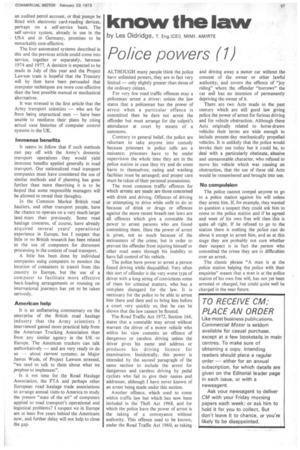know the law
Page 57

If you've noticed an error in this article please click here to report it so we can fix it.
by Les Oldridge, T. Eng.(CEI). MIMI. AMIRTE
Police powers (1)
ALTHOUGH many people think the police have unlimited powers, they are in fact very limited — only slightly greater than those of the ordinary citizen.
For very few road traffic offences may a policeman arrest a driver; unless the law states that a policeman has the power of arrest when a particular offence is committed then he dare not arrest the offender but must arrange for the culprit's attendance at court by means of a summons.
Contrary to general belief, the police are reluctant to take anyone into custody because prisoners in police cells are a nuisance; prisoners have to be under supervision the whole time they are in the police station in case they try and do some harm to themselves; eating and washing facilities must be arranged; and proper care must be taken of their personal possessions.
The most common traffic offences for which arrests are made are those concerned with drink and driving. Offences of driving or attempting to drive while unfit to do so because of drink or drugs or offences against the more recent breath-test laws are all offences which give a constable the power to arrest persons who are found committing them. Here the power of arrest is given, not so much because of the seriousness of the crime, but in order to prevent the offender from injuring himself or other road users through his inability to have full control of his vehicle.
The police have power to arrest a person found driving while disqualified. Very often this sort of offender is the very worst type of driver with a long string of convictions some of them for criminal matters, who has a complete disregard for the law. It is necessary for the police to be able to arrest him there and then and to bring him before a court very quickly so, that he can be shown that the law cannot be flouted.
The Road Traffic Act 1972, Section 164, states that a constable may arrest without warrant the driver of a motor vehicle who within his view commits an offence of dangerous or careless driving unless the driver gives his name and address or produces his driving licence for examination. Incidentally, this power is extended by the second paragraph of the same section to include the arrest for dangerous and careless driving by pedal cyclists who fail to give their names and addresses, although I have never known of an arrest being made under this section.
Another offence, which used to come within traffic law but which has now been included in the Theft Act 1968, and for which the police have the power of arrest is the taking of a conveyance without authority. This offence used to be known, under the Road Traffic Act 1960, as taking
and driving away a motor car without the consent of the owner or other lawful authority, and covers the offence of "joy riding". where the offender "borrows" the car and has no intention of permanently depriving the owner of it.
There are two Acts made in the past century which are still good law giving police the power of arrest for furious driving and for vehicle obstruction. Although these Acts originally related to horse-drawn vehicles their terms are wide enough to include present-day mechanically propelled vehicles. It is unlikely that the police would invoke their use today but it could be, to deal with a particularly obstinate, abusive and unreasonable character, who refused to move his vehicle which was causing an obstruction, that the use of these old Acts would be remembered and brought into use.
No compulsion
The police cannot compel anyone to go to a police station against his will unless they arrest him. If, for example, they wanted to question a suspect they could ask him to come to the police station and if he agreed and went of his own free will then this is quite all right. If he refused to go to the station there is nothing the police can do about it except to arrest him, and as at this stage they are probably not sure whether their suspect is in fact the person who committed the crime they are in difficulties over an arrest.
The classic phrase "A man is at the police station helping the police with their enquiries" means that a man is at the police station of his own free will, has not yet been arrested or charged, but could quite well be charged in the near future.
































































































